Published in Nacional number 625, 2007-11-06
INTERNATIONAL BACKDROP TO THE CRISIS IN BOSNIA
Putin lashes out at the West by way of Republika Srpska
RUSSIA AND SERBIA have again closed political ranks over the issue of Republika Srpska: if they cannot prevent the independence of Kosovo, they wish to break up Bosnia & Herzegovina
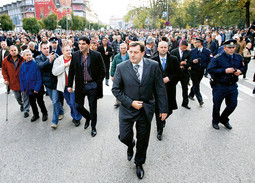 A revival of the so-called spontaneous peoples' gatherings last month in Banja Luka as a part of the Republika Srpska Prime Minister's strategy to break up Bosnia & Herzegovina A protest rally was held on Monday, 29 October, at Krajina Square in downtown Banja Luka, organised by a SPONA, an association of non-governmental, but also pro-government organisations in Republika Srpska, against the High Representative of the International Community in Bosnia & Herzegovina, 44-year-old Slovak diplomat Miroslav Lajcak. Some 10,000 people gathered for the rally to protest against the changes that Lajcak adopted on 19 October in the decision making process of the Council of Ministers, which is in fact the Government of Bosnia & Herzegovina, and in the joint Parliament of Bosnia & Herzegovina.
A revival of the so-called spontaneous peoples' gatherings last month in Banja Luka as a part of the Republika Srpska Prime Minister's strategy to break up Bosnia & Herzegovina A protest rally was held on Monday, 29 October, at Krajina Square in downtown Banja Luka, organised by a SPONA, an association of non-governmental, but also pro-government organisations in Republika Srpska, against the High Representative of the International Community in Bosnia & Herzegovina, 44-year-old Slovak diplomat Miroslav Lajcak. Some 10,000 people gathered for the rally to protest against the changes that Lajcak adopted on 19 October in the decision making process of the Council of Ministers, which is in fact the Government of Bosnia & Herzegovina, and in the joint Parliament of Bosnia & Herzegovina.
The changes where introduced by Lajcak in order to facilitate the work of the two common state institutions in Bosnia & Herzegovina, whose work is very poor, who in fact do not work at all, mostly because of a lack of quorum, and that again because of the absence of representatives from the Republika Srpska. Only a dozen laws have been passed over the past year. Lajcak adopted the changes after the most crucial talks recently led between the representatives of the three peoples of Bosnia & Herzegovina fell through. The negotiations were aimed at abolishing the entity police forces and to organise the police at the federal level. The representatives of Republika Srpska opposed the move and derailed the negotiations. As the representative of the international community in Bosnia & Herzegovina, Lajcak has wide-sweeping powers: he can dismiss and official and adopt any kind of law on his own – but what he did on 19 October was entirely benign. He simply adopted measures whereby he wished to compel members of Government and Parliament to be present at sessions by changing the rules of that body so that decisions could be adopted without those absent. But in the Republika Srpska they have depicted these measures of his as if the, at the very least, abolished the Republika Srpska.
Milorad Dodik, Prime Minister of Republika Srpska, has in particular begun to clamour against Lajcak. The former merchant from Laktas near Banja Luka was not a part of the clique of war criminals around Radovan Karadzic and Ratko Mladic, but did get rich at the time. Later on – precisely because he was not on of Karadzic's people – the Western countries backed him as the man for the post of prime minister and he – alternatively in power and out of it, thanks to his quarrelsome nature – became the key politician in Republika Srpska.
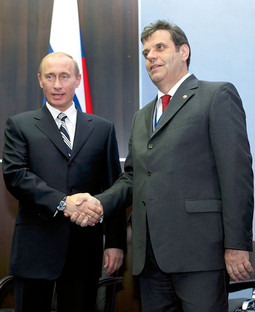 VLADIMIR PUTIN AND VOJISLAV KOSTUNICA The Serbian public is increasingly against closer ties with the EU and is advocating a policy of alliance with Russia Dodik first started yelling at Lajcak demanding he withdraw his measures, falsely claiming that Lajcak thereby made it possible for the representatives of the Bosnians and Croatians to outvote the Serbs, which is untrue, because the Serbs cannot be outvoted if they turn up for the sessions. He threatened to withdraw his representatives from the joint institutions of Bosnia & Herzegovina, and he will be followed in that move by the representatives of other parties both in power and in the opposition in Republika Srpska, that have as one stood with him. There were other threats, for example that the People's Assembly of Republika Srpska would withdraw all powers it had in previous years transferred to the joint institutions of Bosnia & Herzegovina, and that it would demand that the powers of the High Representative be revoked, which is an absurd threat because these authorities do not depend on Republika Srpska.
VLADIMIR PUTIN AND VOJISLAV KOSTUNICA The Serbian public is increasingly against closer ties with the EU and is advocating a policy of alliance with Russia Dodik first started yelling at Lajcak demanding he withdraw his measures, falsely claiming that Lajcak thereby made it possible for the representatives of the Bosnians and Croatians to outvote the Serbs, which is untrue, because the Serbs cannot be outvoted if they turn up for the sessions. He threatened to withdraw his representatives from the joint institutions of Bosnia & Herzegovina, and he will be followed in that move by the representatives of other parties both in power and in the opposition in Republika Srpska, that have as one stood with him. There were other threats, for example that the People's Assembly of Republika Srpska would withdraw all powers it had in previous years transferred to the joint institutions of Bosnia & Herzegovina, and that it would demand that the powers of the High Representative be revoked, which is an absurd threat because these authorities do not depend on Republika Srpska.
In the Republika Srpska all Serbian parties and most of the press, the Republika Srpska Radio & Television Company in particular, has stood by Dodik. Veterans' and concentration camp internees' associations, and even the union have made their voices heard, and the Republika Srpska railway workers' union has even organised a five-minute protest strike. The SPONA association has come on board and organised protests against Lajcak in all larger townships in the Republika Srpska, and in so doing have revived the practice of organised "spontaneous peoples' events". The central rally in Banja Luka was special in one detail. Along with the usual banners accusing the international community of a conspiracy against the Serbs, and those deriding Lajcak as their lackey, there were also many pictures of Russian President Vladimir Putin. This is particularly significant.
Lajcak, and also the representatives of western nations present in Bosnia & Herzegovina, and the Bosnian and Croatian politicians were surprised by this kind of reaction from Dodik, as it was excessive. Lajcak himself announced that he would not back down from his decisions. He laughed off the threats of the People's Assembly of Republika Srpska concerning his authorities, saying that they could discuss this in the Republika Srpska with as much authority as they could the abolition of the death penalty in California. He was backed in this position by the ambassadors of the USA, Great Britain, Germany and some other countries in Sarajevo, and from Brussels by Javier Solana, a member of the European Commission charged with foreign policy, from the State Department in Washington, and from UN Secretary General Ban Ki-Moon in New York.
Dodik did not garner any support from the other two nations in Bosnia & Herzegovina for his attacks against Lajcak, even thought Lajcak's measures apply to Bosnians and Croats in the same way as they do to the Serbs. But he did get strong support from Belgrade, as Serbian Prime Minister Vojislav Kostunica fiercely attacked Lajcak demanding that he tender his resignation. In Sarajevo a emergency meeting was held of the Council for the Implementation of Peace in Bosnia & Herzegovina, an international forum composed of the representatives of the leading powers set up after the Dayton Agreement was concluded in 1995 to oversee the implementation of the agreement. It was agreed there that his decisions were legitimate, and he was given political support for them from all with the exception of Russia. The Russian representative in the forum criticised Lajcak of having incited the crisis in Bosnia & Herzegovina with his decisions because he, as it was said, allowed of the outvoting of "one nation". He was in fact saying the same thing as the representatives of Republika Srpska were, which was not a coincidence.
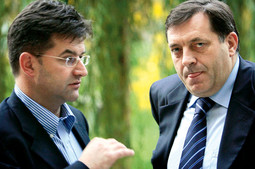 LAJCAK AND DODIK The Slovak diplomat at the head of the Office of the High Representative has a dangerous opponent in the form of the agile and quarrelsome Prime Minister of Republika Srpska Just a day after Lajcak announced his decision, namely, Milorad Dodik made an emergency visit to Belgrade and, as far as is currently known, met there with Kostunica and Vladimir Tutin, assistant to the Russian minister of external affairs. A coordinated political action was hammered out there to use Lajcak's measures to drastically escalate the crisis in Bosnia & Herzegovina, to block the institutions of Bosnia & Herzegovina and, even if the international community were to toughen its stance, to go as far as to threaten to call a referendum on breaking the Republika Srpska away from Bosnia & Herzegovina. In Belgrade Dodik also appeared on "Oko", a high-viewership political talk show on Serbian state TV and not only attacked Lajcak there but also made statements that clearly indicated what his intentions were. He said that Bosnia & Herzegovina was a mock state, that it was imposed on Serbs and that what nothing at all to do with Sarajevo. He declared openly that there was nothing binding him to Sarajevo, but rather only to Belgrade and stated some personal positions regarding Serbianism and national orientation.
LAJCAK AND DODIK The Slovak diplomat at the head of the Office of the High Representative has a dangerous opponent in the form of the agile and quarrelsome Prime Minister of Republika Srpska Just a day after Lajcak announced his decision, namely, Milorad Dodik made an emergency visit to Belgrade and, as far as is currently known, met there with Kostunica and Vladimir Tutin, assistant to the Russian minister of external affairs. A coordinated political action was hammered out there to use Lajcak's measures to drastically escalate the crisis in Bosnia & Herzegovina, to block the institutions of Bosnia & Herzegovina and, even if the international community were to toughen its stance, to go as far as to threaten to call a referendum on breaking the Republika Srpska away from Bosnia & Herzegovina. In Belgrade Dodik also appeared on "Oko", a high-viewership political talk show on Serbian state TV and not only attacked Lajcak there but also made statements that clearly indicated what his intentions were. He said that Bosnia & Herzegovina was a mock state, that it was imposed on Serbs and that what nothing at all to do with Sarajevo. He declared openly that there was nothing binding him to Sarajevo, but rather only to Belgrade and stated some personal positions regarding Serbianism and national orientation.
Behind it all it is clear why Dodik is doing all he can to undermine Bosnian unity – his only goal is that the current Republika Srpska be joined to Serbia in a single state. Wherever he can he endeavours to weaken the joint institutions of Bosnia & Herzegovina, and that is why his people are boycotting and sabotaging the work of joint institutions and are causing disputes on every issue to prove that these institutions cannot function. He was particularly agile in sabotaging the talks on the reform of the police force. During the negotiations he would always agree in principle when it came to the concepts of the reform. But whenever the discussion turned to concrete measures on transferring powers from the entities to federal bodies, he would then block them. At the same time he argued to the inhabitants of Republika Srpska that any reform of Republika Srpska in which the government of Republika Srpska would lose exclusive power over the police would be the beginning of the end of the Republika Srpska itself in which Dodik, in some opinions, is in the right.
At that same time he is weakening the institutions of Bosnia & Herzegovina he is strengthening the institutions of Republika Srpska, and its economy, which is now stronger than that of the economy of the Federation of Bosnia & Herzegovina. He shrewdly carried out two big deals that bolstered the budget of Republika Srpska. He sold the Republika Srpska telecommunications company to Serbian telecom, which is significant both strategically and financially as it is part of a wider effort to increasingly unite Republika Srpska and Serbia – the merger of the commodities reserves and some other institutions has, for example, been agreed on. At the same time he sold the old refinery in Bosanski Brod to a Russian company after returning significant funds to western investors that had already entered the company. That sale too has, besides economic, both political and strategic significance. He has endeavoured to strengthen Republika Srpska in the institutional and in the symbolic sense, so that its citizens could all the more gain the impression that Republika Srpska is, in fact, already an independent state, that has, apparently, against its will been linked to Bosnia & Herzegovina. What he was doing was best demonstrated by a recent event. Republika Srpska President Milan Jelic died suddenly a few weeks ago. This was a person until them for the most part unknown to the wider public. Dodik proposed him a year ago as his candidate for the post of President of Republika Srpska as he was his yes-man, an insignificant local apparatchik, completely under Dodik's influence. But when Jelic died, Dodik made a national event of it. The burial ceremonies lasted three days, entirely at odds with the significance of the deceased. The level of ceremony, the number of participants, the coverage on state television, the participation of the military and the mass show of grieving on the part of the citizens of Republika Srpska where he lay in state in Banja Luka and at the actual burial in Modrici was at the level of the funeral that was organised in 1980 for President Tito. It was all megalomania and set up with the aim of creating the image of the purported statehood of Republika Srpska.
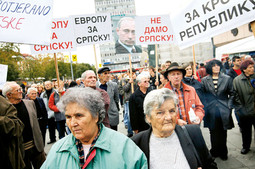 PICTURES OF PUTIN at the demonstrations against Lajcak in Banja Luka Besides all this, ever since he has come into the post of Prime Minister, Dodik has been developing strong political ties to Serbia, especially with Prime Minister Kostunica. Large Serbian Government delegations have on several occasions come to Banja Luka, and Dodik is frequently in Belgrade, and all activities are coordinated there. At the moment Kostunica has one big worry, and that is Kosovo. Based on many indicators, after 10 December, which is the final deadline for the completion of the present phase of negotiations, which will most likely close without an agreement, the Kosovar Albanians will proclaim their independence and the USA and the countries of the EU will recognise this independence. For Kostunica it will on the one hand be a great political failure. But it will, on the other hand, also be for him a great opportunity to turn Serbian politicians to his nationalist political platform of distancing the country from the EU and closer ties to Russia, a move still opposed by pro-European parties of the ruling coalition. Kostunica has already embarked on a brutal verbal war with the West and has managed to draw the wishy-washy pro-West oriented President Boris Tadic into the fray who has reluctantly – "for the salvation of Kosovo" – accepted his quarrel with the West. Kostunica's Democratic party of Serbia has threatened sundry measures against the countries that recognised the independence of Kosovo, and will these days even announce a resolution against Serbia's accession to NATO. There has been a sudden proliferation of propaganda in Serbia to the effect that the country cannot be in friendly relations with those who wish to take Kosovo from it. In his exacerbation of relations with the US and the EU Kostunica has begun to use Republika Srpska as an argument. He has begun to claim that the positions of Republika Srpska and Kosovo are identical, and that if Kosovo is to get independence, that Republika Srpska too then has the right to hold a referendum and itself proclaim independence. Dodik agrees with this.
PICTURES OF PUTIN at the demonstrations against Lajcak in Banja Luka Besides all this, ever since he has come into the post of Prime Minister, Dodik has been developing strong political ties to Serbia, especially with Prime Minister Kostunica. Large Serbian Government delegations have on several occasions come to Banja Luka, and Dodik is frequently in Belgrade, and all activities are coordinated there. At the moment Kostunica has one big worry, and that is Kosovo. Based on many indicators, after 10 December, which is the final deadline for the completion of the present phase of negotiations, which will most likely close without an agreement, the Kosovar Albanians will proclaim their independence and the USA and the countries of the EU will recognise this independence. For Kostunica it will on the one hand be a great political failure. But it will, on the other hand, also be for him a great opportunity to turn Serbian politicians to his nationalist political platform of distancing the country from the EU and closer ties to Russia, a move still opposed by pro-European parties of the ruling coalition. Kostunica has already embarked on a brutal verbal war with the West and has managed to draw the wishy-washy pro-West oriented President Boris Tadic into the fray who has reluctantly – "for the salvation of Kosovo" – accepted his quarrel with the West. Kostunica's Democratic party of Serbia has threatened sundry measures against the countries that recognised the independence of Kosovo, and will these days even announce a resolution against Serbia's accession to NATO. There has been a sudden proliferation of propaganda in Serbia to the effect that the country cannot be in friendly relations with those who wish to take Kosovo from it. In his exacerbation of relations with the US and the EU Kostunica has begun to use Republika Srpska as an argument. He has begun to claim that the positions of Republika Srpska and Kosovo are identical, and that if Kosovo is to get independence, that Republika Srpska too then has the right to hold a referendum and itself proclaim independence. Dodik agrees with this.
In setting a distance between himself and the West Kostunica has begun to seek support in Russia. He has travelled to Moscow on several occasions, spoken with Putin and other Russian officials and begun to build a new alliance. Big Russian companies have suddenly started winning contracts in Serbia where Russia has sent the very capable and powerful Aleksandar Alekseyev to serve as ambassador. Over the past months Russia has begun giving Serbia strong support in connection to the issue of Kosovo. Threatening a veto, it has blocked any possibility of resolving the issue of Kosovo by a resolution of the UN Security Council that would award Kosovo full independence. It also prevented the adoption of a plan drafted by former Finnish President Martti Ahtisaari, whereby Kosovo should start on the road to independence and launch a new round of negotiations with the help of a new troika of mediators. One of the members is Russian diplomat Aleksandar Bocan-Harcenko, the Russian external affairs ministry's special envoy for the Balkans. In the trio he is blocking the efforts of German diplomat Wolfgang Ischinger and US diplomat Frank Wisner that Kosovo be awarded the status of an independent country.
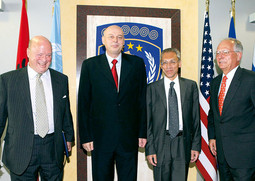 AGIM ÇEKU Prime Minister of Kosovo (second from the left) with the special envoys for Kosovo, the American Wisner, the Russian Harcenko and the EU's Ischinger Russia is the entire time making as if its position arses from reasons of principle, as the territory of a sovereign member of the UN cannot be taken from it. It admits that it opposes Kosovo because, allegedly, other territories could, following that model, seek independence, including some within the Russian Federation. But that is not the key reason Russia is backing Serbia.
AGIM ÇEKU Prime Minister of Kosovo (second from the left) with the special envoys for Kosovo, the American Wisner, the Russian Harcenko and the EU's Ischinger Russia is the entire time making as if its position arses from reasons of principle, as the territory of a sovereign member of the UN cannot be taken from it. It admits that it opposes Kosovo because, allegedly, other territories could, following that model, seek independence, including some within the Russian Federation. But that is not the key reason Russia is backing Serbia.
The key reason is that by way of Serbia Russia has uncovered a topic on which it can in Europe finally oppose the West, and in doing so not only flex its muscles, but also in a new way geo-strategically position itself in the Balkans. Russia has stood behind Serbia strongly, and this Russian position concerning Kosovo has seen a sudden swelling of pro-Russian sentiment. While up to recently various proposals to strengthen ties between Russia and Serbia were for the most part derided in the Serbian public, now there are a growing number of advocates of these kinds of ideas. Surveys show that the majority of Serbian citizens still prefer accession to the EU, but support for this is on the downswing, and there is a steep rise in the number of those who feel that the country should align itself to Russia. Especially significant is how people react to the question of what is more important to them, membership in the EU or Kosovo. The majority opt for Kosovo, even if it means that Serbia would not accede to the EU.
But up to now the Russian-Serbian political love affair has been limited only to the issue of Kosovo, and to Serbia; the Republika Srpska was outside of this. These last days, after Lajcak's measures, the situation has changed significantly. Suddenly Russia has become involved in the situation in Bosnia & Herzegovina in the same fashion it is involved in the events around Kosovo. Just as they have blocked western activity concerning Kosovo, now it is as if they are announcing the same kind of blockade of international action when it comes to Republika Srpska. There are signs that the intentions of Dodik will not be the source of the chief problem faced by Lajcak, but rather very likely the Russian Ambassador to Belgrade Alekseyev or Harcenko, the Russian special envoy for the Balkans. In the Republika Srpska they are putting their trust in Russian aid, just as in Serbia they are putting their trust in Russia when it comes to Kosovo. That is why Putin's picture was carried at the rally in Banja Luka.
By all accounts Bosnia & Herzegovina is facing turbulent times, because Lajcak has announced that he would not only implement his latest measures, but that he would also embark on the complete implementation of all measures for the strengthening of the joint institutions of that country foreseen by the Dayton Agreement that have not to date been implemented. Washington and Brussels are indicating that Lajcak will have their full support in doing so, which means that the West is preparing for a confrontation with Russia in Bosnia & Herzegovina. That the crisis could take a turn for the worse was indicated by Admiral Hans-Jochen Witthauer, the commander of the EUFOR military force in Bosnia & Herzegovina, who a few days ago told the Mostar-based Dnevni list daily that the international community was capable of intervening in the event of a new war.
"The instability is evident not only in Bosnia & Herzegovina, but also in the entire region of the western Balkans, for which reason we continue to maintain the minimum amount of troops here so that they could intervene, and so that they could be capable of preventing any kind of new war from breaking out. The resolution of the issue of Kosovo creates certain problems that reflect on the entire region. It is still a fragile and unstable region where ethnic tensions rule, so that the international community needs to give its full attention to the problems here."
EUFOR currently has 2500 soldiers in Bosnia & Herzegovina, but NATO has announced that it can quickly deploy the forces it needs in the event of a conflict in Bosnia from Germany and Italy.
Related articles
HDZ Bosnia & Herzegovina and Dodik join forces to divvy up Bosnia
A meeting between Serbian President Boris Tadic, Republika Srpska Prime Minister Milorad Dodik and HDZ Bosnia & Herzegovina president Dragan… Više
Latest news
-
28.10.2010. / 14:15
'A profitable INA is in everyone's interest'
-
28.10.2010. / 09:38
Sanader’s eight fear SDP — Won’t bring down Government
-
21.10.2010. / 15:02
Interior Ministry turned a blind eye on Pukanic assassination
-
20.10.2010. / 09:34
Barisic could bankrupt HDZ




